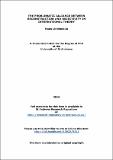Files in this item
The problematic alliance between reconstruction and objectivity in international theory
Item metadata
| dc.contributor.advisor | Rengger, N. J. (Nicholas J.) | |
| dc.contributor.author | Lindenlaub, Hans | |
| dc.coverage.spatial | [10], 218 p. | en_US |
| dc.date.accessioned | 2016-08-16T12:00:28Z | |
| dc.date.available | 2016-08-16T12:00:28Z | |
| dc.date.issued | 2016-06 | |
| dc.identifier | uk.bl.ethos.693134 | |
| dc.identifier.uri | https://hdl.handle.net/10023/9311 | |
| dc.description.abstract | This thesis aims to critique three leading advocates of a particular strand of post-positivism, which has become influential in contemporary international theory, and which is characterized by three defining features: the idea that a proper understanding of the world requires taking into account the intrinsically contingent character of that world, which is developed in opposition to the positivist philosophy of science; the attempt to conceptualize the contingent coming about of identities and practices as an ongoing and open process of intersubjective (re-) constitution; and the aim to understand this ongoing intersubjective constitution in a way that excludes normative judgements. The main purpose of the thesis is to point out a tension between these three features. What it argues is that the conceptualization of practices as intersubjectively constituted stands in tension with both the aim to account for the contingent character of these practices and the aim to understand these practices in a way that excludes normative judgements. In particular, the thesis attempts to point out three problems that arise from the combination of these three aims: first, it argues that the notion of intersubjective constitution entails a particular kind of determinism, which undermines the post-positivists' aim to account for the contingent character of practices; second, the thesis argues that this notion inevitably entails a normative stance by the theorist, which undermines the post-positivists' aim to understand intersubjective process of in a way that excludes normative judgements; third, it argues that, in the post-positivist empirical analyses, this normative stance is never defended and, as a result, entails the arbitrary privileging of particular moral attitudes over others. The main implication of this critique suggest the need for a fundamentally different notion of social scientific understanding, which explicitly recognizes and grounds the role of moral judgements. A minor implication is that contemporary cosmopolitan agendas in world politics seem inherently flawed. | en_US |
| dc.language.iso | en | en_US |
| dc.publisher | University of St Andrews | |
| dc.subject.lcc | JZ1305.L56 | |
| dc.subject.lcsh | International relations--Philosophy | en_US |
| dc.subject.lcsh | Positivism | en_US |
| dc.title | The problematic alliance between reconstruction and objectivity in international theory | en_US |
| dc.type | Thesis | en_US |
| dc.type.qualificationlevel | Doctoral | en_US |
| dc.type.qualificationname | PhD Doctor of Philosophy | en_US |
| dc.publisher.institution | The University of St Andrews | en_US |
This item appears in the following Collection(s)
Items in the St Andrews Research Repository are protected by copyright, with all rights reserved, unless otherwise indicated.

